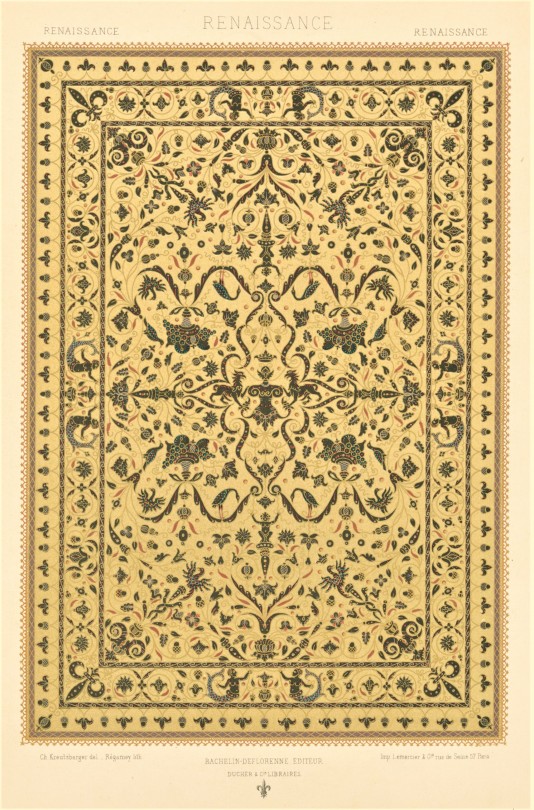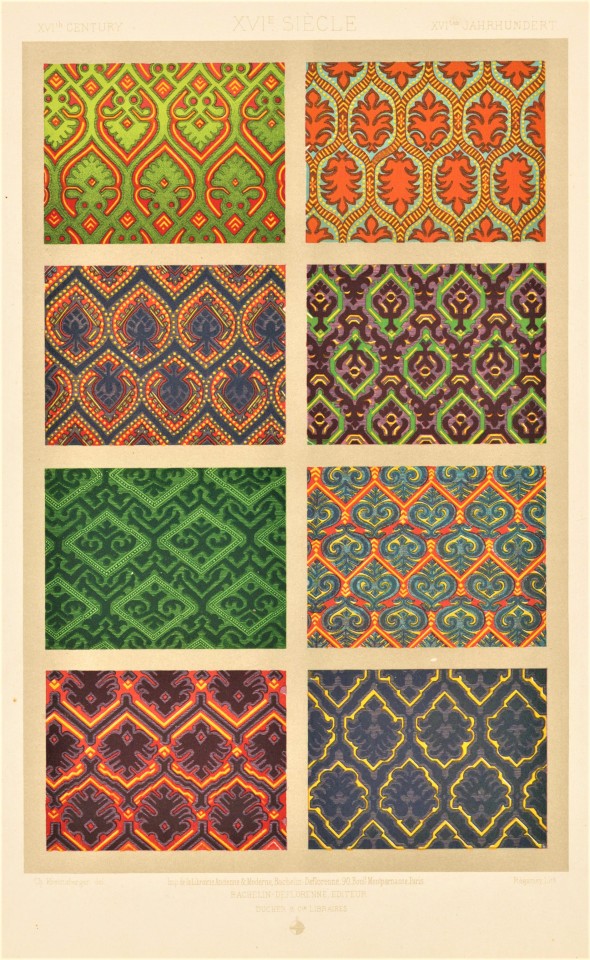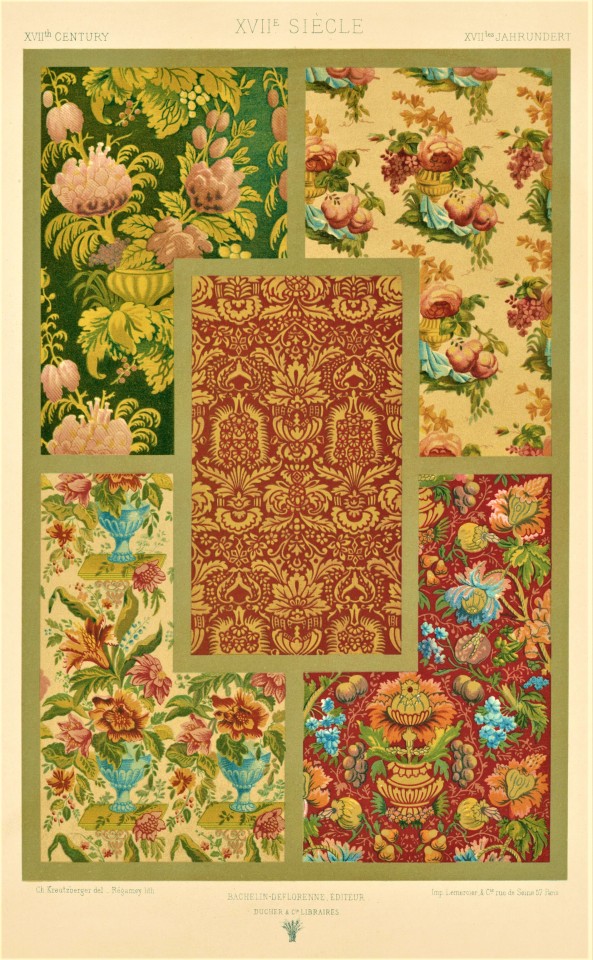#Alcan-Levy
Photo










Decorative Sunday
This Sunday we present plates from L’ornament des Tissus: Recueil Historique et Pratique (The Ornament of Fabric: A Historical and Practical Collection), a French portfolio publication of one hundred chromolithographs highlighting textile design through the ages. The portfolio was published in 1877 in Paris by Ducher et Cie, publishers for the Société Centrale des Architectes, with introductory essays and explanatory texts accompanying each plate by Auguste Dupont-Auberville, a successful banker and collector of porcelain and textiles.
Charles Kreutzberger illustrated the textile designs and the lithography was completed by Frédéric Régamey. Text was printed by L'imprimerie Alcan-Lévy, the printing outfit of Félix Alcan. Alcan’s father Moyse Alcan was a publisher in their hometown of Metz, and his grandfather Gerson-Lévy was an educator, publisher, author, and translator, and was one of the earliest advocate of Reform Judaism in France.
See image captions for description of plates.
You can find more Decorative Sunday posts here.
-Olivia, Special Collections Graduate Intern
#Decorative Sunday#L'ornament des Tissus#Decorative Arts#decorative plates#Textiles#Fabric Design#chromolithography#chromolithographs#Yay chromoliths!#Ducher & Cie#Dupont-Auberville#Kreutzberger#Regamey#Alcan-Levy#Felix Alcan#Moise Alcan#Gerson-Levy#Olivia
88 notes
·
View notes
Photo

FOUR CASE STUDENTS RECEIVED THE RIO TINTO/ALCAN LEGACY FUND AGRICULTURE SCHOLARSHIP. Four Portland-based College of Agriculture Science and Education (CASE) students were recently awarded the lucrative annual 2022 Rio Tinto/Alcan Legacy Fund Agriculture Scholarship. Minister of Transport and Mining, Hon. Audley Shaw (centre), participates in the handover of a cheque valued at more than $2.7 million to four students who are pursuing studies at the Portland-based College of Agriculture Science and Education (CASE). Occasion was the presentation of the Rio Tinto/Alcan Legacy Fund Agriculture Scholarship at the Ministry in Kingston on October 13. The students are Tamoi McLean (second left); Daunja Galloway (third left) and Celine Sitladeen (third right). Absent is Vanessa McMurrine. Sharing in the presentation are Acting General Manager, Jamaica Bauxite Institute (JBI), Joan Thomas Levy (left); Chairman, Rio Tinto/Alcan Legacy Fund Board, Sherene Golding Campbell (second right); and Principal Director, Mining/Minerals (Acting) in the Ministry, Suresh Bhalai (right). In the background are Director of Bauxite Lands, Jamaica Bauxite Institute (JBI), Kemoy Lindsay; and Programme Executioner, Development Bank of Jamaica (DBJ, Pamela Nesbeth. The students, who are pursuing studies at the Portland-based College of Agriculture Science and Education (CASE), are Tomai McLean; Celine Sitladeen; Daunja Galloway and Vanessa McMurrine. Read full article on www.ScholarshipJamaica.com with link 🔗 in bio 🆙⬆️. #scholarshipjamaica #CASE #collegeofagriculture #alcanscholarships #riotinto #agriculturescholarships @wedoagriculture (at ScholarshipJamaica.com) https://www.instagram.com/p/Cj3iSN9OYVy/?igshid=NGJjMDIxMWI=
0 notes
Text
“Communism is accused, however, of sacrificing the individual and denying freedom. And no doubt, were it to be born premature, through the use of forceps, before reaching its full term, a stunted version of communism might well induce many people to regret the good old days that preceded it. But if it is to be the child of science, who will dare denounce the infant of such a mother? Where, moreover, is the evidence that might support the accusations that are levelled against it? Since the accused has never yet lived, they amount to nothing but an unfounded insult.
And in whose name is this arrogant supposition put forth? In the name of that individualism which, for thousands of years, has continuously killed both freedom and the individual. How many individual members of the human race have managed to avoid becoming either its slaves or victims? One in every ten thousand, perhaps. Ten thousand martyrs for one executioner! Ten thousand slaves for one tyrant! And still they plead in the name of freedom! I understand what they are up to! What a sinister subterfuge, concealed behind a definition. Does not oligarchy call itself democracy, falsity honesty, slaughter moderation?
We all know what it really amounts to, this freedom that pleads against communism – it is the freedom to enslave, the freedom to exploit at will, the freedom of the great and the good as Renan likes to put it, with the multitude as their stepping stone. This form of freedom is something that the people call oppression and crime. They no longer want to nourish it with their flesh and blood.
Moralists and legislators all insist, in principle, that man must sacrifice a part of his freedom to society – in other words, that the freedom of the individual has for its limit the freedom of others. But does the existing order, with its two categories of the privileged and the pariahs, adhere to this conception? How many people must endure servitude in order to allow one person to live free? 10, 20, 60, 100, 2000, 30,000, 100,000? The penalties to be paid are endless, and so are the ways of levying them. Only the chains do not change.
Every infringement of the freedom of others violates the moralists’ own definition of the word – which is indeed the only legitimate definition, even though it has thus far always remained vain and empty. Freedom implies social parity amongst individuals, from which it follows that equality is the limit to freedom.
Only thorough-going association can satisfy this sovereign law. The old order tramples on it, without shame or pity. Communism safeguards the individual; individualism exterminates it. For the one, every individual is sacred. The other cares for individuals as much as it does for earthworms, and slaughters them in a manner worthy of that bloody trinity, Loyola, Caesar and Shylock; and afterwards it says, with phlegm: ‘Establishment of community would mean sacrifice of the individual.’”
- Louis-Auguste Blanqui, “Communism, the Future of Society (1869),” in Critique Sociale: Volume I (Paris: Félix Alcan, 1885)
#louis-auguste blanqui#blanqui#blanquism#communism#the future of society#french history#the enlightenment#critiques of individualism#critiques of capitalism#revolutionary communism#moralism#anti-moralism
1 note
·
View note
Text
Trump to see ‘national security’ threat in Canada firsthand
By Alan Freeman, Washington Post, June 7, 2018
OTTAWA--When President Trump peeks out the window of Air Force One as it lands in Quebec on Friday before a meeting of Group of Seven leaders, he’s likely to spot a key “national security threat” at the heart of his recent trade action against Canada.
As the military version of the Boeing 747 circles over the Bagotville air base, it will fly over the vast aluminum smelters, hydroelectric transmission lines, port facilities and bright red bauxite ponds belonging to global mining firm Rio Tinto.
Powered by cheap hydro power from the Quebec region’s vast water resources, these facilities have been the center of Canada’s aluminum industry since before the Second World War and still produce a big portion of Canada’s output of the metal, most of which is exported to the United States.
In imposing a 10 percent tariff on aluminum imports from Canada, as well as a 25 percent levy on imports of steel, Trump cited the need to protect U.S. “national security” from the dangers of excessive dependence on suppliers like Canada, Mexico and the European Union. The administration argues that the increased imports have led to the closing of U.S. steel and aluminum plants, leaving the U.S. industry at risk of becoming unsustainable, thus threatening national security.
Canadian officials, led by Prime Minister Justin Trudeau, say that calling Canada a national security threat is “insulting” and “absurd,” pointing to the irony of Trump’s use of the Bagotville base as a sign he misunderstands Canada’s history as an American ally and supplier of strategic metals.
Trump’s trip will be his first to Canada as president, a break in the tradition that used to see American presidents make their first foreign visit north of the border.
The origins of the Bagotville base go back to the early 1940s, when U.S. aluminum interests hacked through Quebec’s thick conifer forests to build dams to expand the massive Alcan aluminum smelting complex that was to provide the lightweight metal essential to the war effort.
“The main reason for the base was to protect the aluminum plants as well as the infrastructure, the dams and the dikes that produced the power to make the aluminum,” said Marc-Andre Valiquette, an amateur historian, former Canadian forces pilot and author of a recent history of the base.
“It was built in 1940 and 1941. Europe was losing the war. Britain was threatened. U-boats were coming down the St. Lawrence River,” he said. The aluminum produced by Alcan was essential for the construction of war planes in the United States, Canada and Britain, so the Royal Canadian Air Force built the base to protect those facilities.
Alcan publicity from the period makes a clear link to the war effort. “Water power, one of Canada’s greatest natural resources, has gone to war,” said one magazine ad picturing a roaring river. “In the Saguenay Valley, it is generating energy in tremendous volume to transform British Guiana bauxite into shiny light aluminum, the metal of air mastery and victory.”
Although the aluminum complex now belongs to British-based Rio Tinto, the region’s American heritage is still evident. Arvida, the planned community built to house Alcan workers, was named for Arthur Vining Davis, the founder of Aluminum Co. of America (Alcoa). One of the big thoroughfares in the area is Mellon Boulevard, named after Andrew Mellon, the Pittsburgh banker, Alcoa investor and U.S. treasury secretary.
And as Trudeau repeats whenever interviewed on American television, Canadian aluminum still ends up in U.S. fighter aircraft and its steel is used in American tanks.
James Hasik, senior fellow at the Brent Scowcroft Center on International Security at the Atlantic Council, said that nobody he knows in the national security community believes that invocation of the Section 232 national security clause has any substance.
“I can’t imagine the circumstances in which a Canadian federal government would try to choke off aluminum supplies to the U.S.,” Hasik said.
0 notes